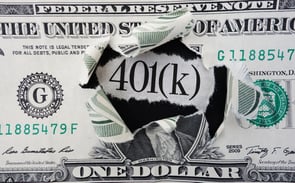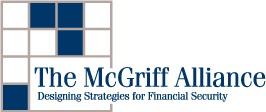 You've probably heard it 100 times: Never cash out your 401(k).
You've probably heard it 100 times: Never cash out your 401(k).
It's a "common wisdom" mantra that has been repeated time and time again by almost everyone who has ever filled out a 1099 tax form.
But should you buy into it?
That's the question more and more people wrestle with as the scars left by the Great Recession remain visible across the country. Homes, jobs, savings and 401(k)s were lost during that time—leaving people to wonder if the "common wisdom" they've been listening to isn't so wise after all today.
These days, people are considering cashing out their 401(k)s in order to protect their money as well as their futures. And while it might make sense for you, especially if you are practicing prosperity economics, you'll want to have a clear understanding of the advantages and disadvantages before making a move.
The Advantages
Most people probably won't tell you about the advantages of cashing out your 401(k). But it's not because they don't exist. Here's a look at seven reasons why it might make sense to liquidate your 401(k):
- Fees. Mutual funds don't manage themselves, which is why you wind up paying significant fees to put your money into a 401(k). Over time, these fees add up, resulting in slow investment growth and diminishing your profits. Taking your money out of a 401(k) can save you a significant amount of money on fees.
- Options. Your 401(k) doesn't provide many investment options. It most likely exclusively consists of mutual funds, which are comprised of securities and are vulnerable to the ups and downs of the stock market. Prosperity economics is all about having options—and then leveraging them.
- Taxes. It's been said that the only things in life that are certain are death and taxes—and even then, taxes aren't guaranteed to remain the same. In fact, it's extremely likely that income tax rates will continue to rise, which means taking money from your plan will actually cost you more than you thought. It also means that a Roth account or other investment could be a better option.
- Limitations. People who have money in a 401(k) have limited options when it comes to how they can (and cannot) borrow their own money to improve their lives. They can't use it to start a business, invest in real estate or use it for other investment opportunities. Other options let you leverage against your retirement accounts.
- Inefficiency. Even when you are allowed to borrow against your 401(k), you still take a tremendous tax hit. This is because the money that went into your account was "tax deferred," but it needs to be replaced with "after tax" dollars, meaning you'll be taxed a second time for your own money. This can add up to losses of 35 percent or more. Other options, such as life insurance with cash value, don't penalize you for borrowing your own money.
- Politics. Believe it or not, politicians don't always have your best interests at heart when they make decisions. And politicians make the rules that govern your 401(k). One of the principles of prosperity economics is that you control your money—not politicians or anyone else.
- Debt. Consumer debt is a financial albatross that has millions of families drowning in a sea of high-interest monthly payments. Imagine the financial freedom they could experience if they were able to use their 401(k)s to pay off their high-interest debt, increase their cash flow, save more and invest more effectively.
The Disadvantages
While there are many compelling reasons to cash out your 401(k), there are also reasons you may not want to liquidate. Here's a look at four:
- Taxes. If you are ready to cash out your 401(k), you need to be ready for the penalties, which are also known as taxes. They are extensive and can be difficult to pay all at once. Many people who decide to liquidate do it over the course of several years to minimize the penalties.
- Timing. When the Great Recession started back in 2008, many investors took huge losses and yanked their money out of the stock market. And while this seemed like a good move at the time, it actually could have been the wrong move. The best time to pull your money out of a 401(k) isn't after a loss; it's while the stock market is performing well.
- Habits. If you're not good at saving money, you might not want to cash out your 401(k). One of the best things about 401(k) retirement plans is that they force people to save money, which is always a good idea (and one of the principles of prosperity economics). So if you don't have good saving habits, liquidating may not be the right option for you.
- Strategy. If you don't have a strategy for investing your money after you pull it out of your 401(k), you're likely to find yourself in a financial free fall. People who don't have a strategy, don't know how to invest or don't understand prosperity economics are often better off leaving their money in their 401(k)s.
It's All About Education
At the end of the day, educating yourself about how your 401(k) works and what it can (and cannot) help you accomplish is the key to deciding if you should liquidate your investment accounts and re-invest somewhere else.
Unfortunately, you won't be likely to find the education you need in the pamphlets your employer provides or from the plan administrators. After all, if they truly educated you about how to invest, you would likely yank your money from their funds and make different decisions about where to put it.
What you really need to do in order to maximize your investment dollars is become educated about a financial philosophy, and prosperity economics is a great place to start.
Educating yourself about prosperity economics will give you the tools you need to invest the right amount in the right places at the right times (rather than chasing high rates of return and investing more than you can actually afford to invest). Once you understand how prosperity economics works, you will likely:
- Save more money (prosperity economics recommends saving between 10 and 20 percent of your income)
- Have more liquid assets, which you can tap into whenever emergencies or opportunities arise (meaning you don't have to tap into your 401(k) and deal with the penalties)
- Invest more of your money in things that offer steady, guaranteed returns you can count on and that aren't held hostage by the ups and downs of the stock market
- Control more of your money so you can invest in real estate, life insurance and other opportunities that best meet your current financial situation as well as your goals for the future.
Make the Decision That's Right for Your Future
If you listen to conventional wisdom, you will likely do what the vast majority of Americans do and keep your money in a 401(k). You'll pay fees that add up over time. You'll pay taxes and penalties if you need to tap into it for an emergency. And your money might not ever realize its full earning potential.
On the other hand, if you educate yourself about the potential benefits of cashing out your 401(k), follow the principles of prosperity economics to develop a sound strategy and put your money where it's both accessible and guaranteed to deliver solid results, you just might find a path to a brighter financial future.
If you think that cashing out your 401(k) might be the best decision for you, it's time to eschew "common wisdom" and talk to an expert in prosperity economics today.






Leave a comment